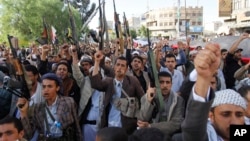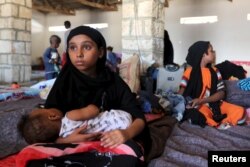Heavy airstrikes by a Saudi-led coalition continued Friday in Yemen, while al-Qaida made gains in the country's east.
The Sunni Arab-led coalition carried out bombings in several cities, including the capital, Sana'a, the country's second-largest city, Taiz, and the southern port city of Aden.
The coalition is targeting Shi'ite Houthi rebels, who are believed to be backed by Iran.
Al-Qaida is capitalizing on the chaos to strengthen its stronghold in Yemen's east. On Friday, al-Qaida fighters overran a key army camp in the capital of Hadramawt province, Mukalla. Officials said they seized tanks, rocket launchers and small arms.
Also Friday, President Barack Obama spoke by phone with Saudi Arabia's King Salman. The White House says the two leaders agreed on the need for a political solution for Yemen that is facilitated by the United Nations.
Iran's foreign minister, Mohammad Javad Zarif, submitted a Yemen peace plan to the United Nations Friday. The plan calls for an end to all foreign attacks, the resumption of Yemeni-led talks, and a national unity government.
The move comes a day after U.N. Secretary-General Ban Ki-moon called for an "immediate cease-fire" in Yemen.
In a speech in Washington, Ban warned Yemen was "in flames" and said the only resolution was for "all sides" to stop hostilities and take part in negotiations.
"The United Nations-supported diplomatic process remains the best way out of a drawn-out war with terrifying implications for regional stability," he said at the National Press Club.
The U.N. Human Rights Office reported at least 405 civilians have been killed and 785 wounded in fighting since the coalition began airstrikes March 25 against the Houthis.
"Even before the latest escalation, two out of three Yemenis relied on humanitarian assistance," Ban said. "Levels of food insecurity were higher than in the poorest stretches of Africa."
The cease-fire would reduce suffering, enable the delivery of humanitarian aid and, ideally, facilitate negotiations, he said.
Appeal for aid
On Friday, the U.N. sent out an urgent appeal for $274 million to help provide emergency assistance to the 7.5 million affected by the conflict. At least 150,000 have been displaced by the violence, it said in a statement.
"Thousands of families have now fled their homes as a result of the fighting and airstrikes," the statement said. "Ordinary families are struggling to access health care, water, food and fuel — basic requirements for their survival."
The decade-old conflict in Yemen "escalated significantly in March, spreading to many parts of the country," said the U.N. It noted airstrikes "have now affected 18 of Yemen's 22 governorates."
Cedric Schweizer, head of the Yemen delegation for the International Committee of the Red Cross, described aid delivery efforts as hampered by a complex, volatile sitution in which aid workers are under attack and ambulances are being targeted and stolen. He also said electricity and medicine shortages are dire.
New special envoy expected
Earlier this week, the U.N. special envoy to Yemen, the Morocco-born Jamal Benomar, left his post after failing to bring both sides together for peace talks.
Diplomatic sources have said Mauritanian diplomat Ismail Ould Cheikh Ahmed would be named as Benomar's replacement, possibly as early as Friday.
The Saudis and many of their coalition allies reportedly were frustrated with what they saw as Benomar's soft stance toward the Houthis.
Ban has not commented on Benomar's replacement, but the U.N. chief said Thursday the Saudis have assured him they understand "there must be a political process."
No crippling blow
The airstrike campaign so far has failed to deliver a decisive blow against the Houthis, instead helping to create a security vacuum in many parts of the country.
The Houthis took control of the capital, Sana'a, in September. They have since swept southward, forcing the Western-backed President Abd-Rabbu Mansour Hadi to flee.
The Houthis are allied with former Yemeni President Ali Abdullah Saleh, who was ousted as part of the so-called Arab Spring protests in 2012.
Al-Qaida in the Arabian Peninsula, considered one of the world's most powerful terrorist groups, hopes to use the chaos to expand its influence in the country.
On Thursday, al-Qaida militants took control of a major airport in Mukalla, a southern port city and the capital of Yemen's largest province, Hadramawt.
Officials say the al-Qaida fighters faced little resistance from the military Thursday in Mukalla. A major oil terminal in southern Yemen also fell under the control of militants.
Earlier this month, al-Qaida fighters captured a Yemeni military camp in Mukalla. They also stormed a prison in the city, freeing close to 300 prisoners.
Lisa Schlein contributed reporting from Geneva.













